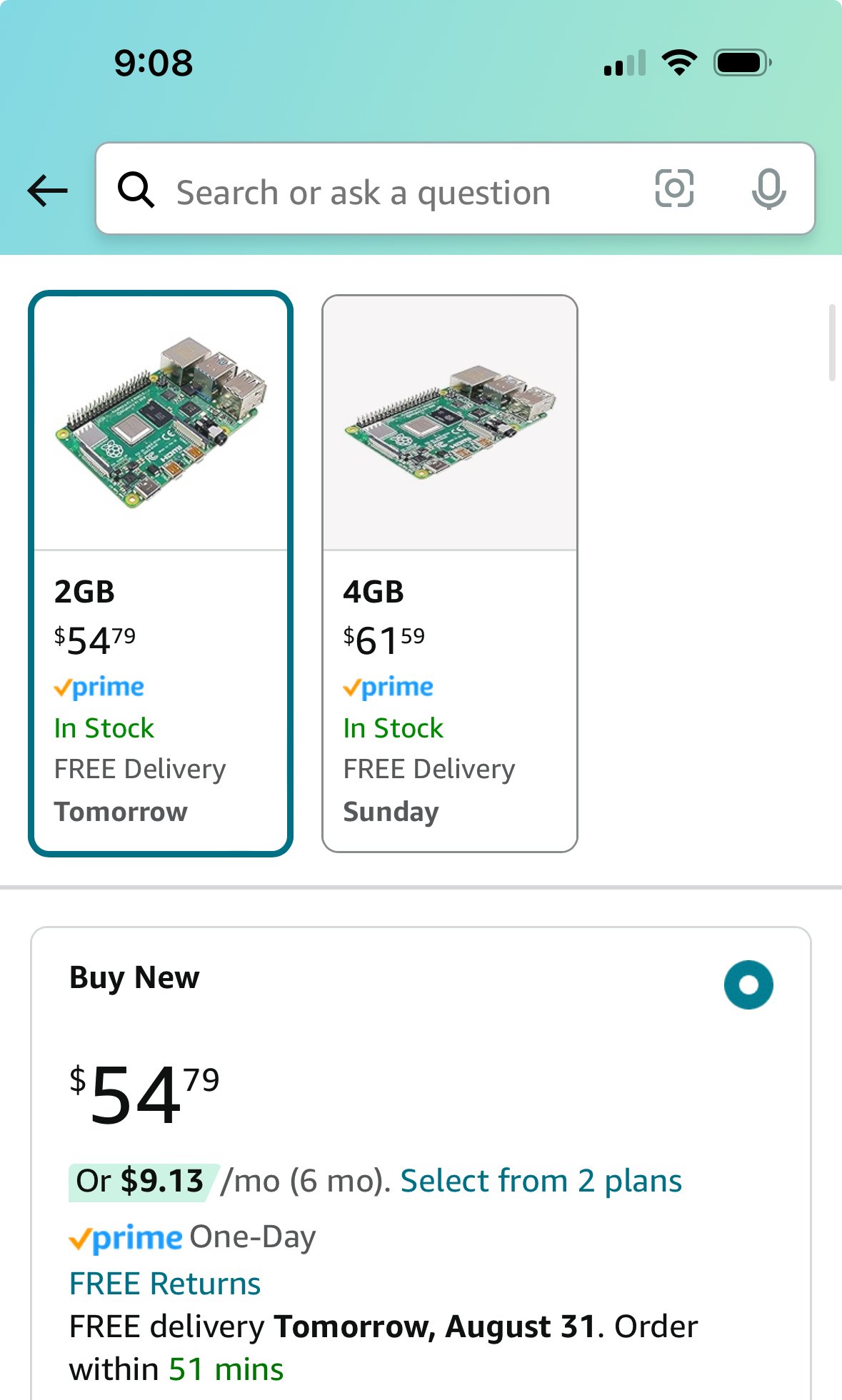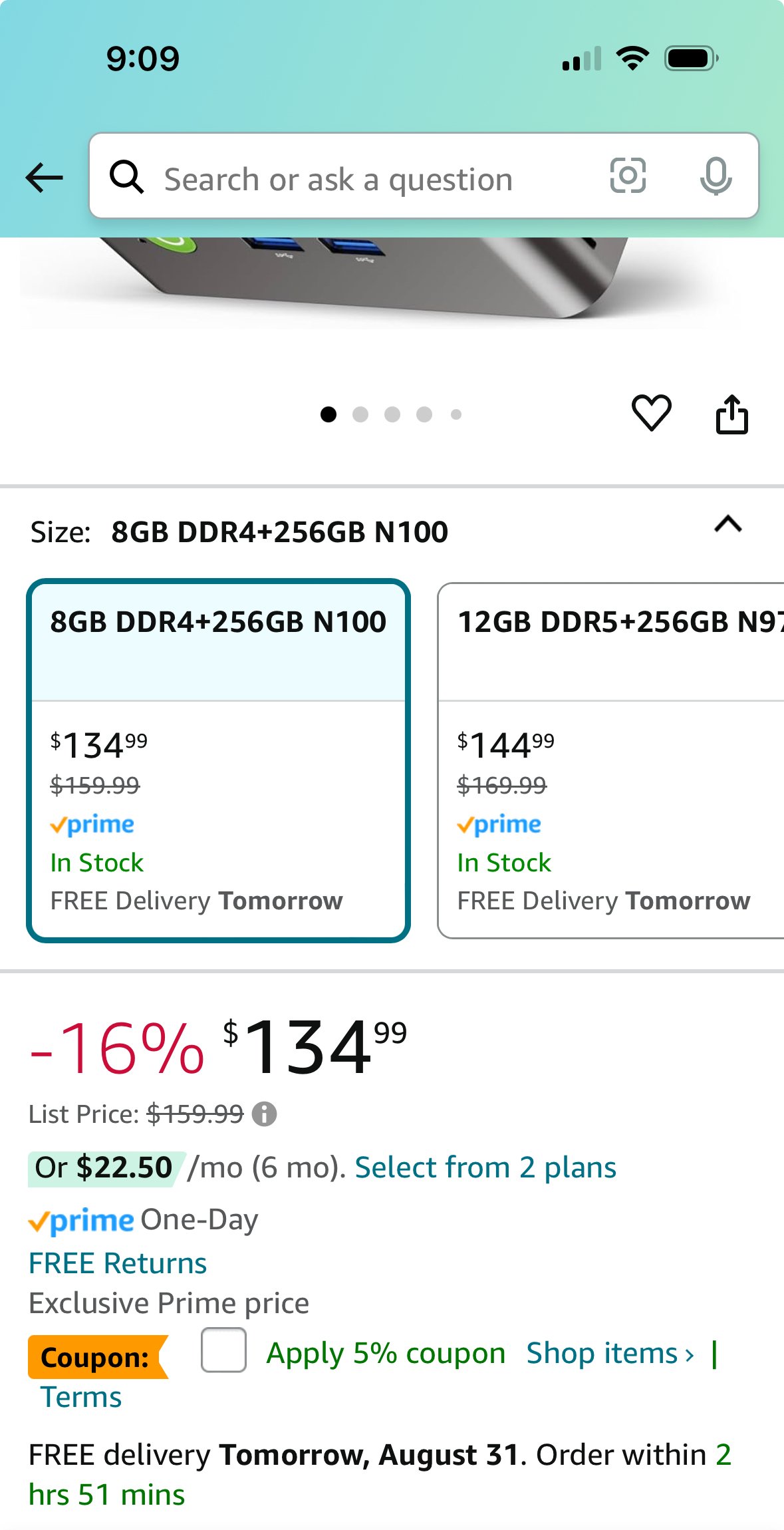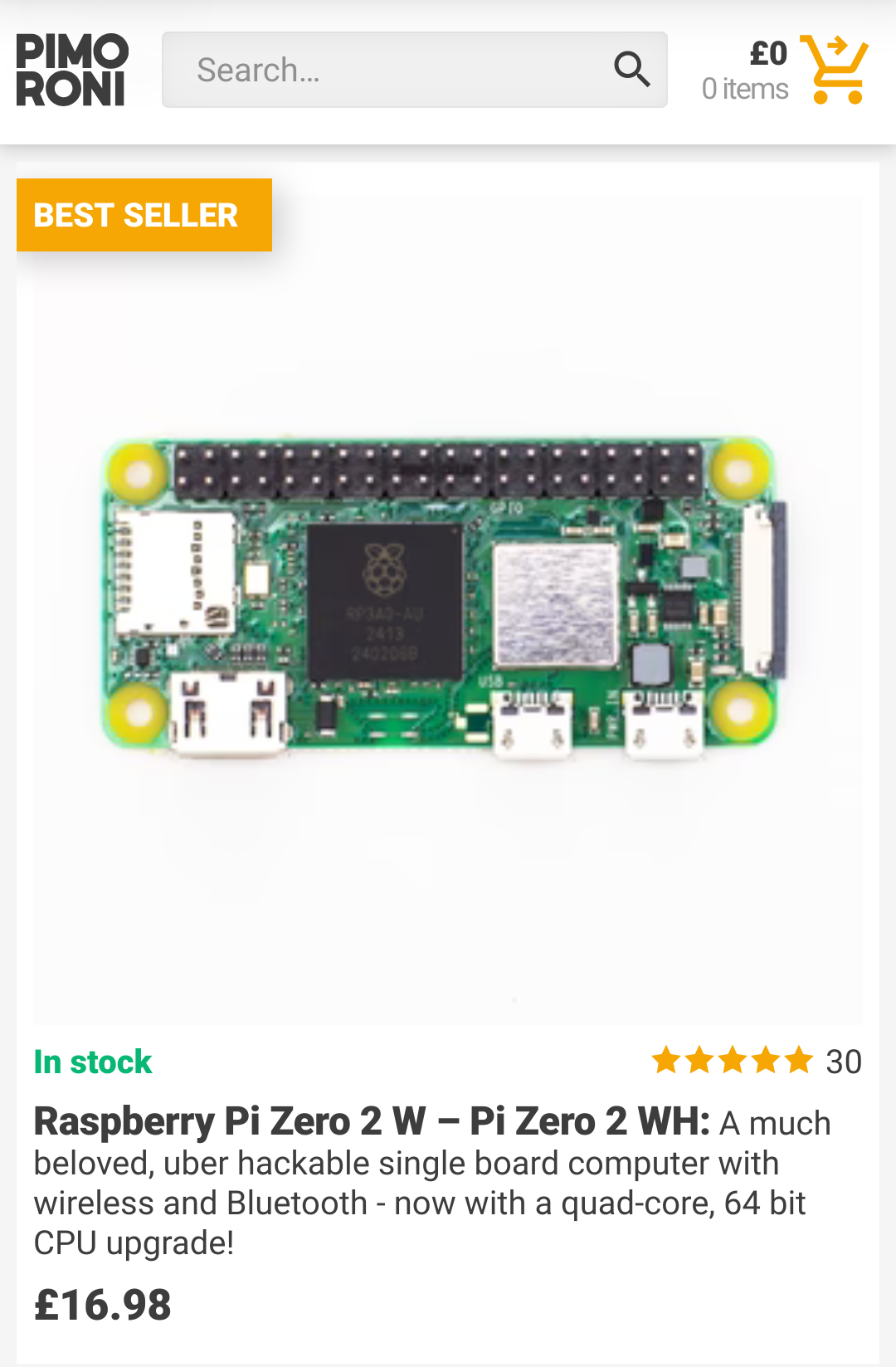With Chromecasts being discontinued, increase in ads, telemetry, etc I’m wondering if anyone else is going back to old school HTPCs or if they have some other solution to do this in house.
I think the options here are likely:
- Rooted streamer (ie Chromecast, firestick)
- Android Box
- Mini PC
I’m actually most interested in experimenting with #3, a mini PC running KDE Plasma Bigscreen. Most of my self hosted apps can be run in browser windows, and a full desktop (while harder to navigate) is better than the browsers you can get on Android.
What is everyone esle, especially the privacy / de-googled self hosters doing for their media front end?
I was looking into something similar recently, and asked around on Lemmy. The general consensus I heard was that a Mini PC weren’t ideal, mostly I think due to the fact that they aren’t designed purely for streaming.
One think someone said piqued my interest, and I might try this. They recommended buying a cheap, Android TV compatible streaming box (like an Onn brand one), and side-loading an open source (and ad-free) launcher onto it.
I found this thread over on the Huffman Shitshow that had some good instructions.
Huffman Shitshow
LoL
This is basically what I do, except the quicker way without using ADB to remove anything. Might try removing the junk though to see if it makes a difference. Launcher Manager and Flauncher makes an Onn 4K very snappy. Hard to beat for $20 and a little setup effort. I used to use Firesticks for years, but they get so slow and constantly revert my launcher changes. Finally got rid of them all.
Have you found a way to stream Netflix at 4K?
Sorry, no idea. Dumped Netflix years ago.
If you want to put in more work for more freedom, a lot of SBC’s can do something similar too.
Not even that much work. Libre elec is pretty simple as long as you don’t do anything too creative
N100 mini PC imo. $150 does everything.
All my current self-hosting is running off an N100 mini-PC. OPNsense, NginX, Home Assistant, Unifi Controller, Docker host, etc. They are fantastic, it just seems a bit overkill for sitting behind the TV and playing Plex/Jellyfin and the occasional web stream in a browser. There’s really not much competition though as all the products below it offer a lot older processors that don’t have very up to date HW decode.
Same. Seems like overkill when you can see what it can do. But also at that price you can velcro it to the back of your tv and it can literally do anything so have at. I don’t see a lot of better options. I use full computers personally.
What optimized application do you run for the big screen and easy navigation? What about remote control?
I haven’t done it other than for testing, but you can pair a fire Stick remote to a PC using Bluetooth and it works with Kodi.
Stremio/Plex with a Microsoft keyboard that has a touchpad built in. It’s big but you can get small ones off Amazon for $20
I’d recommend the Pepper Jobs windows 10 gyro remote. I’ve got two of them because they’re so great.
Are those Windows only?
No. They emulate a keyboard, and use the keyboard shortcuts to do things in Windows. So they won’t work out of the box in Linux, but you can add each of the keys as a keyboard shortcut, then they’ll work.
Anyway to do this without a keyboard. I used to have a PC connected to my TV for this but eventually just bought an apple tv for simplicity.
I have one of these: http://www.riitek.com/product/254.html
The back has a keyboard, the front has programmible buttons for the TV (mostly just used for on/off), and the rest is a bunch of buttons connected to the PC.
I use it with Kodi but it’s a pretty user friendly way to control it once it’s set up.
I don’t recommend this one with kde desktop Not sure how it is with big screen.
If you are looking to clone TV remote IR buttons there is this one. The orange buttons can clone TV remote buttons. https://www.amazon.com/Rii-Wireless-Keyboard-Touchpad-Controller/dp/B0C5LFLL3G/ref=mp_s_a_1_1_pp?crid=247JUEQKDFAAL&dib=eyJ2IjoiMSJ9.J1g9QtAF8xB3mG5ZS6etrWUR8cxrIbmY-Oit0UosNDdx9GOe4HOH-SC-IgSIymfthR7fZA7_WdoiGNPvKqQzpXxYvOVi4cy7zqdiaK3qTTq8s5T7F8mWjjIICmOJFabGJAaYknW4Yo82sn18O3n_Vb2D-E0LQYl7qgUqoUcAJd07BoTIgZTmgvqsqWl_3clD0sbzKhjFKfDdixiRLuBCSw.5mMB6rANHKQtxt1qbEeHzMvBxR3Rep5-BBOJFQlMZZs&dib_tag=se&keywords=rii&qid=1725324362&sprefix=rii%2Caps%2C127&sr=8-1
If you are going to use a PC desktop (kde is great) I recommend getting one with the scroll wheel.
Remote control over your phone or using a Xbox controller like if it were a console. Back in the day I had an htpc remote but ability to control apps is inconsistent.
For me nothing is more simple then a PC interface. I hate having to scroll using a TV remote it takes so long to do anything and it’s quite limiting in other ways.
Phone wouldn’t work for me, I’ve got a strict no phone around the TV rule for myself because I’m way too tempted to just use it instead of enjoying the thing I’m watching. Also wouldn’t really want to put an Xbox controller onto my wife or step mother.
I wish there was some kind of application you could run that would abstract all the mouse and keyboard interactions into a remote control friendly interface.
Htpc for YouTube and gaming and native tv app plex streaming content from my plex/nas media server (pi4). Works great. Power is crazy high in California right now at over 49c /kwh so I need to boot up the htpc as little as possible.
Exactly. N100 mini PCs are like the Swiss Army Knife of computers. Almost as compact as a Raspberry Pi, and compatible with a lot more things.
And cost 10 times as much.


2.4 times. But, who’s counting?

Just sayin’
I didn’t say Raspberry Pi Zero. Those are niche machines. They’re not fast enough to do general purpose computing.
For OP’s needs they are fine though.
They can’t do 4K video. The best they can do is 1080p30.
I do not think what I would want as a replacement exists (yet). My main requirements are:
- Only FOSS software and firmware
- Similar level of “casting” compatibility/ubiquity as the discontinued Chromecast
- Easy navigation and/or great UI/UX
- Can be controlled with a stand alone remote control, phone/tablet/laptop, and remote services like Home Assistant
- As portable and low powered as the discontinued Chromecast (or no less portable than a small mini-pc)
- Ability to turn on/off the TV, switch inputs, and control the volume
- Ability to install apps/plugins to directly on the device (maybe even things like Lutris, Moonlight, or something similar for gaming)
- Ideally, the apps would be as well maintained and provide similar levels of quality as something like an Android TV or Apple TV
- (bonus) Ability to store media locally for offline playback
I think the closest I have seen is LibreELEC + Kodi on a RaspberryPi or mini-pc. It’s still not quite there for my tastes though. Hopefully the recent Chromecast announcement will lead to more/better alternatives in the coming months!
Your wishlist sounds almost identical to mine. As frustrating as the limitations of streamers are, they are easy to use. HDMI CEC makes single remote setups possible, easy volume changes, input switching, etc. Apps are vetted so they “just work”.
As for casting, most platforms support running Miracast or AirPlay receivers. Google is the stickler here that won’t let you run a Google Cast receiver (or at least I haven’t found one) and also doesn’t implement Miracast on Pixel devices. It’s such a shame because I vastly prefer casting the URL to the TV and letting it source the content than mirroring my phone all the time.
Agreed! I am concerned though that even if a viable casting alternative started gaining momentum that Google would essentially prevent it from being widely adopted or incorporated into apps/websites the way that Chromecast is. I think it would have to be created by a large tech or media company and/or be compatible with Chromecast.
Apps are still really frustrating though. If an app exists (big if), I found the apps to either miss key features compared to the corresponding apps on other platforms or the UI/UX was terrible for a TV app.
I could get by if just one of casting or the apps were comparable to more popular alternatives. Having neither makes it very difficult to moved away from those alternatives.
The casting bit is the missing piece for me.
I’ve built a RasPi with Kodi for our caravan, to use Plex and stream our free-to-air TV here in Australia (using Musk’s space innernets). I just miss being able to cast from my phone, for the occasional thing I can’t do with a Kodi add-on.
The thing that makes casting so appealing for me is how ubiquitous it is. It eliminates situations with guests where they would recommend a show/movie only to find out that I can’t easily play the content because it’s only available on a streaming service that the guest pays for and I do not. As long as the guest brought a device and connected it to my WiFi, it more than likely could be casted without having to install another app and/or sign up for a new service (or have the guest login with their account).
I am becoming less optimistic about it though. I just do not think that the level of ubiquity that Chromecast reached even 10 years ago will be matched with a FOSS alternative. Developers would need to incorporate it into their apps, websites, etc. or it would need to be compatible with existing solutions. I doubt Google will open Chromecast up enough so other options can be fully compatible with it. Additionally, without the backing of a major corporation, I do not see developers taking the time to make their content compatible with another casting option.
I’m still using an Nvidia shield which I guess counts as an android box. I thought they’d release a new version by now, but I’m considering building a htpc instead.
I used to use a raspberry pi 2 or 3 and it worked fine for 1080p content. Not sure if the newer pis support 4k, but it’s on my list to look into eventually.
I love my shields, I have both the tube and the pro in different rooms. I like the Jellyfin AndroidTV app more than Kodi. I have side loaded a different launcher to avoid the ads.
I would love to try and replace it, but it needs to be able to handle 4K UHD rips with hdr and the original sound tracks in ATMOS or whatever.
I really like mine too, I also have a tube and a pro. Both of them have a weird issue with the TV I use most often though. Both shields won’t display anything unless I boot them in safe mode.
They both work on a different tv that is 4k. This one is an older 1080p plasma. But it’s weird that it used to work just fine. It might be related to the TV, but no other devices have issues so it’s cheaper to replace one of the shields than buy a new tv lol.
The mini pc is the most flexible. Batocera works really well and includes:
- Kodi to stream local media and can act as an Airplay receiver
- the ability to run Flatpaks
- a nice 10 ft UI
- emulation backends and moonlight game streaming
- the ability to pair Xbox and PlayStation controllers
Get a usb IR receiver like FLIRC or something similar with HDMI CEC to control everything via standard remote.
The learning curve for Kodi is pretty steep. Most folks aren’t going to bother.
This is the first time I’ve heard anyone say Kodi has a learning curve. I’m curious what you found difficult?
Not OP but I found Kodi incredibly intuitive up until the point that something didn’t behave as expected. Then it was very complicated and support was difficult to find and understand.
Pretty much this. Imagine some untutored user given the jellyfin client. They can figure it out pretty quickly as it is much like Netflix. Compare that to a Kofi on a Pi, first you have a keyboard/mouse. OK, then arrow keys and spacebar get you a ways in - now how do I stop the video? Panic till you find out it’s the X key.
It is the simplicity vs functionality debate. Kodi is amazingly configurable but it is not accessible for your normal household user without a ton of work. Jellyfin(as an example) just runs on the Roku they are already using.
Eventually I’m getting off my old Roku 3 permanently for Kodi, so I’m just saying I wish Kodi had a dummy mode.
You’re describing a completely foreign experience to me. I’ve always controlled Kodi with the TV remote. It’s kind of annoying to type in stuff, but I mostly use Kodi to record and watch jeopardy.
What TV remote?
The one that came with my tv.
I just click up down left right enter return and it works.
If you’re up for using Jellyfin, you can check out something I’m working on to achieve this: https://github.com/MattMckenzy/Homehook
The main branch used to be compatible with chromecast devices, but I’ve stopped maintaining it in favor of the v2 branch, where HomeHook communicates directly with satellite devices through HomeCast. Working with Chromecasts were a huge pain.
Let me know if you have any questions about it, always glad to help!
#3 is the route I’m going.
Bigscreen is still pretty rough though, I’m trying to see if I can resolve some open issues to submit back to resolve, but in the meantime I’m going to start playing with flex launcher - https://complexlogic.github.io/flex-launcher/
Its likely to be the way I go as of now.
Lutris to be a gaming interface (retro games and Roms), jellyfin for movies/shows/music, gcompris for some kids educational stuff, etc.
I want to figure out a remote that I like and get some CEC testing done, may look towards using my homeassistant to act as a control system if its a pain (and most CEC is implemented poorly IMO).
But I’m done with stuff like Chromecast, rokus, etc.
I tried Flex Launcher on RebornOS but couldn’t really get it to even launch stuff, besides the Plex app. Maybe I need to read the documentation better. I think it’s promising but has a steep learning curve. I don’t need it to hold my hand the entire setup but would like a little more help with configuration than it currently offers post install. My issues could also be due to Linux. I haven’t tried the Windows version.
There are some really wicked PC “sticks” (for lack of better word) available these days. I used one from MeLE flashed with Debian as a mobile entertainment center in my travel trailer.
Yeah, those were on my radar as well. I haven’t yet had a chance to look into what the Linux compatibility is like, but that sounds promising that you were able to do it.
The big downside I see is that while the power consumption is low, they’re running a really old SoC, usually based on Intel N4000 (launched late 2017). Looking around it seems to have h.265 decode which is the most important one to look out for. It doesn’t support AV1, but that’s mostly streaming services and not that common (I think?). There may be other disadvantages I’m not thinking of at the moment.
What was the performance like for you?
I can confirm that the one I used 3 years ago could stream Netflix and HBO from browser, no problem. It also handled local files in VLC like a champ.
I even installed Steam and played a handful of non-resource-intensive games on it.
I’d buy another in a heartbeat for use as media rig. This time I’d install barebones Debian on it, instead of med-weight MX like I did prior. It’d probably perform even better.
The issue is they sit in this odd place from a price perspective. I can get an N4000 based stick PC with 4GB RAM and eMMC storage for $140 CAD, or a vastly better performing N95 based mini PC with 8GB RAM, real SSD, and additional outputs for $50 more.
The stick PC really only makes sense if you need that form factor, or if you’re on a really tight budget. The improvements for $50 are just too much to ignore.
Fair points.
The biggest motivating factor for my use case was that it was more than happy to run off a USB C cable tapped into my solar bank’s 12v line. So for boondocking, it was a great solution.
Absolutely. It sounds ideal for something like that.
The USB-C power is huge. I don’t know why it is so hard to find. I do not want another massive power brick and barrel connector.
Acronyms, initialisms, abbreviations, contractions, and other phrases which expand to something larger, that I’ve seen in this thread:
Fewer Letters More Letters NAS Network-Attached Storage Plex Brand of media server package RPi Raspberry Pi brand of SBC SBC Single-Board Computer SSD Solid State Drive mass storage Unifi Ubiquiti WiFi hardware brand
6 acronyms in this thread; the most compressed thread commented on today has 9 acronyms.
[Thread #940 for this sub, first seen 30th Aug 2024, 00:35] [FAQ] [Full list] [Contact] [Source code]
I went back to VLC media player, vlc remote control, and an HDMI cable.
@Fiivemacs @foggenbooty ; I have been looking into using HomeAssistant as the “remote control”, I also have a logitech hub that I can control via home-assistant.
I use an Apple TV 4K. For self hosted streaming, I am running Plex on a Raspberry Pi, connected to a Synology NAS, which has my media library
I’m currently using osmc on raspberry pi 3s with the jellyfin kodi add-on installed. Works like a charm and can also install other video addons as well. Its been rock solid and you can airplay and stream from your phone. Been running this replacement for a year.
OSMC’s Vero V looks interesting. Pi 4 with OSMC or Librelec could work. I’m probably going to do something like this pretty soon. I just set up an *arr stack last week, and just using my smart TV with the jellyfin app installed ATM.
My PC running the Jellyfin server can’t transcode some videos though; probably going to put an Arc a310 in it.
I attach a computer to a TV and open streaming Web sites in a browser. There aren’t much benefits of the streaming devices compared to that unless you’re using surround sound. The Netflix desktop program has surround sound, but that’s the only service I know of.
This is what you want to get surround sound to work in windows again.
This driver will work with both hdmi and toslink (optical) and possibly other connections.
Evidently Microsoft used to include a Dolby digital driver back in the day but has removed it due to licensing.
Oh and this will also enable surround sound in games too.
I do have surround sound, but I wasn’t aware of that being an issue with a PC solution. Have you encountered issues getting that to work?
I haven’t used this in a bit so I thought I’d check it. They somewhat recently updated the desktop program and nothing works at all now. It appears to be just Edge pretending to be another program. It’s literally just a browser, so surround sound doesn’t work now.
It’s a weird thing for them to do. Why would anyone download a copy of edge that can only watch Netflix? You’d just use a browser.
I’ve got a raspberry pi 4 (8GB) running Kodi (via osmc) hooked up to our tv. The tv itself is a Roku tv that isn’t allowed to connect to the internet.
I’ve also got a pc that used to be my streaming/video editing rig back when I used to make videos, but I repurposed it as my server, and it runs Jellyfin, along with a host of other apps/services for me and my family.
The pc is older, but as a server it works great. Biggest drawback is power consumption, it’s not nearly as efficient as a mini pc with a n100 or something similar, but for my purposes it works great.










